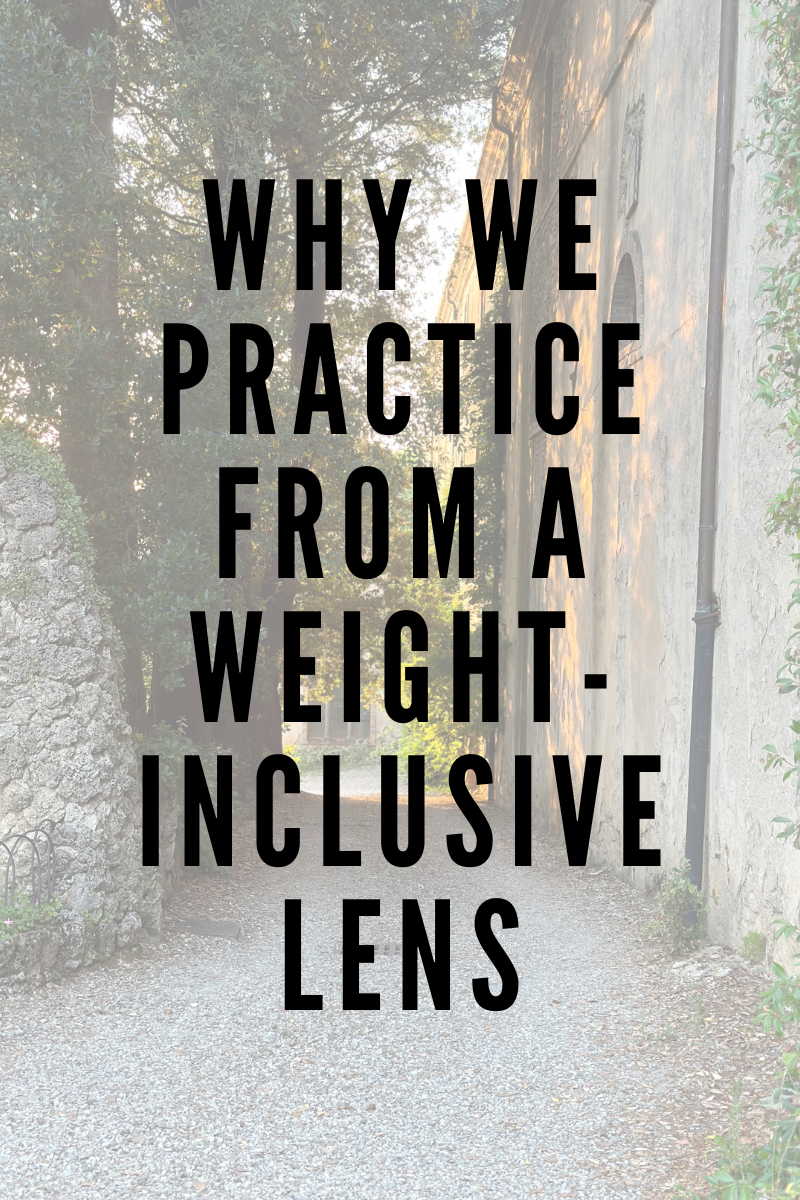Why We Practice from a Weight-Inclusive Lens
During our first interaction with clients, one important question we ask is, “Our approach focuses on a weight-inclusive lens of health. Are you ready to explore an approach that is not focused on weight loss? This is a time to be very self-reflective and consider your level of readiness.” For some new clients who are unaware of our use of the weight inclusive approach, this may be confusing. For many people weight loss and dietitians go hand and hand…and now they’re hearing, “you don’t focus on weight loss?” And may think “What do you do? Why have I been told that my whole life that weight loss is the answer?” So, let’s get into it…
Why is intentional weight loss harmful?
Data concludes that a weight centric model, where intentional weight loss is the goal, can be incredibly harmful. Intentional weight loss forces your body into a state of starvation which can slow down your metabolism and will eventually cause you to regain back the weight you lost and potentially more. Data states that 95% diets (attempts at intentional weight loss) fail. Other health issues that have been correlated with intentional weight loss include:
Loss of muscle mass
Imbalance of hormones
Imbalance of electrolytes
Nutritional deficiency (especially micronutrients), this risk increases significantly with diet pills and weight loss surgery
Increased risk of cardiovascular disease
Increased risk of weight cycling (weight going up and down, up and down), which increases risk of mortality, diabetes, high blood pressure, high cholesterol, and heart disease.
Increased risk of developing an eating disorder
Increased risk of disordered eating
Increased risk of all cause mortality
Increased risk of weight stigma
Weight Stigma
Another reason why at Tory Stroker Nutrition we focus on a weight-inclusive model, is the harmful effects of weight stigma. Weight stigma is rooted in racism and anti-Blackness. Weight stigma harms fat people in many aspects of their life including employment, dating, relationships, accessibility, overall life satisfaction, etc. When practicing from a weight-centric model (recommending weight loss and using weight to define health) there is also an increased risk of high blood pressure, metabolic syndrome, diabetes, high cholesterol, and eating disorders. Not to mention the mental health impacts weight stigma has on fat* patients.
Weight Loss and Health
Weight loss does not equate to health. Someone can have a “high” BMI (read more on why BMI is BS, here) while partaking in healthier behaviors than someone with a BMI in the “normal: range. “In correlational analyses, however, we uncovered no clear relationship between weight loss and health outcomes related to hypertension, diabetes or cholesterol, calling into question whether weight change per se had any causal role in the few effects of the diets. Increased exercise, healthier eating, engagement with the health care system, and social support may have played a role instead” (Chastain, 2021). I think Chastain put it best, “recommending intentional weight loss is recommending that people do something that nobody can prove is possible for a reason that nobody has proven is valid and it does not meet the requirements of ethical, evidence-based medicine.”
Intentional weight loss doesn’t have to feel like your only solution to “get into shape” or “achieve health.” As mentioned above there are so many negative consequences to losing weight intentionally that are both physical and mental. Crash diets are never the solution when it comes to living a “healthy” lifestyle. Learning how to heal your relationship with food and exercise, and work on behavior is a big step in moving towards a more healthy and sustainable lifestyle.
What is a weight inclusive approach?
At Tory Stroker Nutrition, we read all of this data, and feel very clear that a weight inclusive approach to health is the only approach we ethically align with. A “weight-inclusive approach emphasizes looking at health and well-being as multifaceted, while directing efforts toward improving health access and reducing weight stigma” (Tyler, et al 2014). A weight inclusive approach is less harmful, trauma informed, and focuses on patient’s lived experiences. All in all, it feels less harmful, less shameful, gentle, kind and puts the patient in the driver’s seat to advocate for the best care possible. It’s more human.
Notes:
For other ideas of how to increase your health, without intentional weight loss, check out this blog post.
. For more information on this topic, I highly recommend following along Weight and Healthcare, a substack newsletter discussing the topic of weight science, weight stigma, and healthcare for people of higher weights. She is an excellent resource and incredibly knowledgeable.
*I use the word fat as a neutral descriptor, as used in the fat activist community.
More about the collaborating author: Hi! My name is Bella Sarnoff, I am a rising junior at the University of Vermont studying nutrition and food science with a concentration in dietetics. I run my own social media promoting intuitive eating and a balanced lifestyle @bustingthebs.
